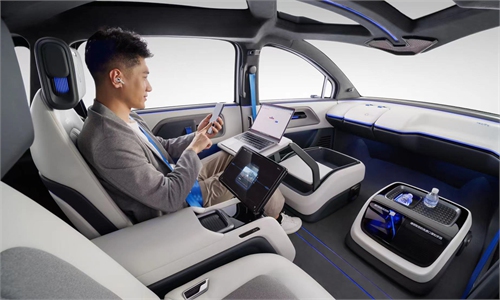Chonqqing, Wuhan kick off commercial operation of fully unmanned auto-driving business

Visitors experience the autonomous driving system of Baidu Apollo at the Shanghai Auto Show, April 19, 2021. Photo: VCG
Technology giant Baidu on Monday announced it has secured the first permit in China to offer commercial fully driverless robotaxi service to the public on open roads.
Apollo Go, Baidu’s autonomous ride-hailing service, is now authorized to collect fares for robotaxi rides - without human drivers sitting in the car - in Chongqing city and Wuhan city, Central China’s Hubei Province.
The permits were granted to Baidu by government agencies in Wuhan and Chongqing’s Yongchuan district. Both cities have been pioneering new approaches to intelligent transportation in recent years, from developing infrastructure to updating new regulations for autonomous vehicles (AVs).
Having received the permits, Baidu will begin to provide fully driverless robotaxi services in designated areas in Wuhan from 9 am to 5 pm, and Chongqing from 9:30 am to 4:30 pm, with five Apollo 5th-generation robotaxis operating in each city. The areas of service cover 13 square kilometers in the Wuhan Economic & Technological Development Zone, and 30 square kilometers in Chongqing’s Yongchuan district.
Recently, a few Chinese self-driving companies have announced new investments and the landing of self-driving taxi service after the nation's first regulation on smart vehicles came into effect in Shenzhen, South China's Guangdong Province, earlier this month.
On August 2, Chinese electric car maker Xpeng Motors announced the completion of Fuyao, China's largest autonomous driving intelligence center, in Ulanqab, North China's Inner Mongolia Autonomous Region, for autonomous driving model training, in collaboration with Alibaba.
On the same day, another autonomous driving technology company Pony.ai said it would reach an agreement with ride-hailing firm Cao Cao Mobility to promote large-scale deployment of self-driving taxi hailing service.
Market watchers said that China's self-driving vehicle industry is accelerating and consolidating its position as the global leader in the field.
As of the end of March 2022, Baidu said it has ranked No.1 in the accumulative number of autonomous driving patents application in China, totaling 4,000; among them, the number of global patent families for high-level autonomous driving has exceeded 1,500, ranking first worldwide.
Having expanded to all first-tier cities in China, covering Beijing, Shanghai, Guangzhou, and Shenzhen, Apollo Go has now become the world’s largest robotaxi service provider, recently reaching the milestone of more than one million bookings.
China has designated more than 5,000 kilometers of road for autonomous driving testing, and it has also issued more than 900 test licenses, according to Guo Shougang, an official with the Ministry of Industry and Information Technology, at an internet connected vehicle forum in Beijing.
Global Times


